May 29, 2025 | 11:41 GMT +7
May 29, 2025 | 11:41 GMT +7
Hotline: 0913.378.918
May 29, 2025 | 11:41 GMT +7
Hotline: 0913.378.918
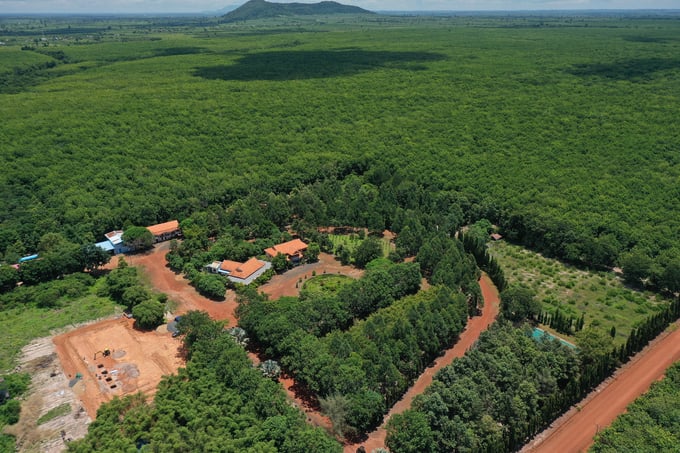
The headquarters of Phuoc Haa Kampong Thom Rubber Development Co., Ltd. is designed with Cambodian architectural style, nestled within the rubber forest. Photo: Tung Dinh.
As the second generation of Cambodians involved with Phuoc Hoa Kampong Thom Rubber Development Co., Ltd., Moeurng Vanng was recently promoted to the position of Deputy Director of Farm 3 just over two months ago.
Vanng's parents are employees of the company. After finishing high school, Vanng, born in 1989, decided to stay with rubber cultivation rather than moving to the city or the capital for work. In addition to a stable income and savings on travel expenses, he benefits from being close to his parents and has the opportunity to engage in agricultural activities after work hours.
Starting as a rubber caretaker in 2009, Vanng's capabilities led him to be promoted first to Team Leader of the Rubber Care Team at Farm 3 and then to Deputy Director of Farm 3 on June 1, 2024.
With his proficiency in Vietnamese, Vanng shared, “As a team leader, I managed over 100 workers, but in my new position, the total number has increased to 401 people. All of them are Cambodian".
Although he is very familiar with his technical work, Vanng admits that as a Deputy Director of the Farm, he still feels inexperienced and is continuing to learn how to organize tasks and effectively fulfill his management duties.
Currently, on weekends, Vanng is enrolled in additional courses to enhance his management skills. His wife, who previously worked as a rubber tapper, has since stopped working to run a small business from home and take care of their two children. Since his promotion to Deputy Director of the Farm, Vanng’s salary has shifted from riel to USD and he now earns 700 USD/month.
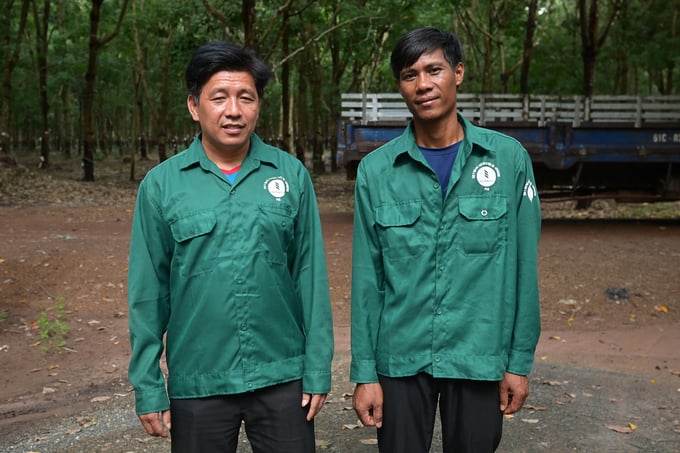
Moeurng Vanng (right) and Buoy Sophorn are Cambodian indirect management staff within the Phuoc Hoa Kampong Thom Rubber system. Photo: Tung Dinh.
Eight years older than Vanng, Buoy Sophorn is currently the Head of the Inspection and Security Department at Phước Hòa Kampong Thom Rubber, overseeing 78 security and protection staff. His team's responsibilities include safeguarding assets such as trees, latex and facilities, as well as maintaining security within the company's managed areas.
Unlike Vanng, Sophorn is very proficient in Vietnamese, having spent five years studying at Hanoi. "I studied at National Economics University for five years, including one year of Vietnamese language. After graduating in 2009, I came to Phuoc Hoa Kampong Thom Rubber for a job through a friend's recommendation", the Cambodian department head recounts.
With a background in banking, Sophorn joined the company as a specialist in the Organization Department. At that time, the Inspection and Security Unit was part of the Organization Department. In 2022, the unit was separated into its own Inspection and Security Department and Sophorn has been the head of this department since then, with a current monthly salary of 900 USD.
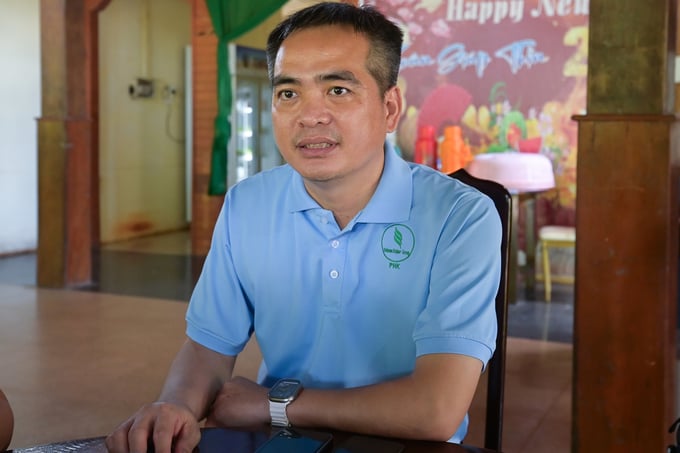
Mr. Tran Hoang Giang, General Director of the company, shared insights about the company's operations in Cambodia. Photo: Tung Dinh.
It is evident that this role is best suited for locals. Sophorn also shared that despite being outside his field of study, he was chosen for the position due to his suitability: "Our work involves frequent interaction with local security forces, extensive communication with workers, security personnel and local residents".
Having grown from direct roles, being fluent in Vietnamese and possessing a deep understanding of Cambodian culture, indirect managers like Vanng and Sophorn play a crucial role as a bridge between the company leadership and the workers. While they are able to provide structured guidance and training for new employees, they also effectively communicate the company’s policies and benefits to more experienced workers.
Conversely, as locals, their advice and recommendations to senior leaders on Cambodian culture, customs and practices are highly valuable in overall management.
Having been with Phuoc Hoa Kampong Thom for 15 years, both Vanng and Sophorn recount how the local people once faced numerous hardships. There were no roads, electricity, or water, some practiced shifting cultivation and depended on the forest, while others migrated to Phnom Penh or Thailand for work. Today, the surrounding area has seen remarkable development, with convenient roads, asphalted paths reaching every village.
For the workers, they receive housing, free clean water and electricity supplied directly to their rooms. Their children can go to school and they benefit from various other perks such as bonuses, allowances, essential goods and meals during breaks. Most importantly, they enjoy a stable income, averaging 1.35 million riel/month (approximately 324 USD) and can save significantly on living expenses.
Sharing more deeply, Mr. Tran Hoang Giang, General Director of Phuoc Hoa Kampong Thom Rubber Development Co., Ltd., stated: “In addition to increasing income and improving the living conditions of our workers, the presence of our company has also contributed to transforming and enhancing the surrounding community. It has driven significant economic and service development in the area”.
According to Mr. Giang, the most noteworthy achievement is that since the introduction of rubber trees and their proven effectiveness, the local Cambodian people have been very supportive, which has greatly contributed to maintaining a highly stable security situation.
The head of Phuoc Hoa Kampong Thom Rubber Development Co., Ltd. proudly stated that the company's accomplishments over the past 15 years have played a significant role in strengthening the diplomatic relations between Vietnam and Cambodia.
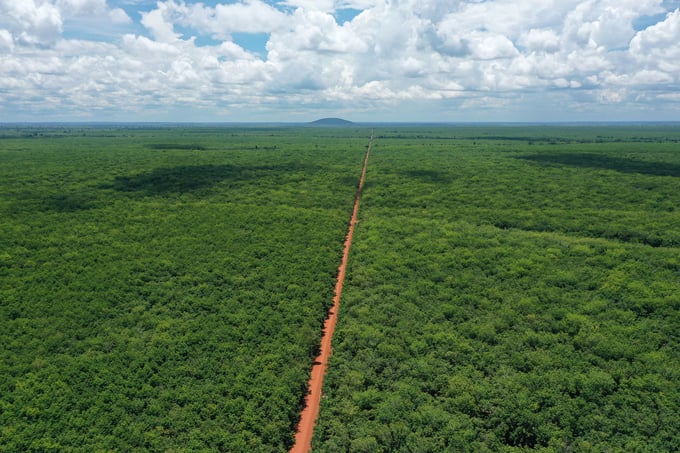
The expansive, lush green rubber fields of Phuoc Hoa Kampong Thom Rubber Development Co., Ltd. Photo: Tung Dinh.
Returning to the topic of Cambodian managers in indirect roles, Mr. Tran Hoang Giang explained that these individuals are locals who deeply understand the culture, lifestyle, customs of their community and speak the language fluently. This familiarity allows them to effectively communicate and implement the company's policies and directives to the workers, overcoming barriers that Vietnamese managers might face.
Currently, the company operates three rubber plantations, each divided into four production teams. Each team is led by a team leader and two assistant team leaders, all positions are Cambodians.
At the plantation level, each unit has one director and one deputy director, with only one of the deputy directors being a local Cambodian. The company aims to increase this number to three local deputy directors.
"Rubber cultivation is still relatively new in Cambodia, so many people have not yet qualified to take on the deputy director positions. We are actively providing training and educational opportunities to help them take on these roles in the near future", said General Director Giang.
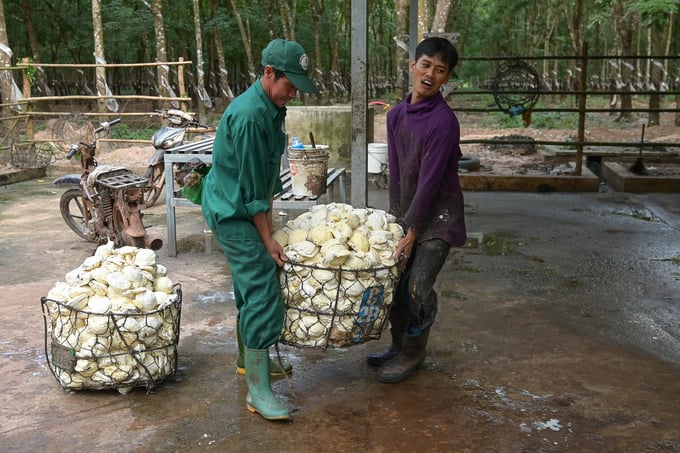
Cambodian workers tapping rubber in the plantation. Photo: Tung Dinh.
Phuoc Hoa Kampong Thom Rubber Development Co., Ltd., established in 2009 with a total investment of 55 million USD, has a total area of 8.694 hectares, of which 7.664 hectares are used for rubber cultivation, with operations commencing in 2016.
In terms of infrastructure, after 15 years of development, the company has invested in 16.6 km of 22kV medium-voltage power lines, over 150 km of roads, 114 housing units for workers, nearly 100 wells, 2 health stations and 2 schools.
These facilities not only serve the company's employees but also meet the needs of the surrounding community. Additionally, to support local religious life, the company has collaborated with neighboring rubber units to build a temple for the local residents.
Each year, the company contributes over USD 37.000 to local social welfare funds and more than USD 17.000 to environmental funds.
Translated by Phuong Linh
/2025/05/25/4127-3-073637_820.jpg)
(VAN) Thanks to the promotion from an FAO-implemented project, vegetable production in greenhouses in Moc Chau has seen strong development, from 1.5 hectares in 2021 to nearly 50 hectares in 2024.

(VAN) FAO has recently supported USD 140,000 to implement the project 'Risk mitigation human-animal interface risks through disease control initiatives in pig farming.'

(VAN) The People's Committee of Tra Vinh province has approved an adjustment to the investment policy for the Green Hydrogen Plant project, increasing its area to approximately 52.76 hectares.
![Reducing emissions from rice fields: [2] Farmers’ commitment to the soil](https://t.ex-cdn.com/nongnghiepmoitruong.vn/608w/files/news/2025/05/05/dsc08881jpg-nongnghiep-140632.jpg)
(VAN) Clean rice cultivation model in Thuong Tan commune, Bac Tan Uyen district, is assisting local residents in achieving sustainable agriculture by substantially reducing costs, increasing productivity, and protecting the environment.

(VAN) At the conference to disseminate Resolution No. 68, AgriS introduced its digital agricultural ecosystem and reaffirmed its commitment to accompanying the Government in promoting private sector development and sustainable agriculture.

(VAN) 'Blue Ocean - Blue Foods' initiative is designed to restore marine ecosystems and establish sustainable livelihoods for local communities by cultivating a minimum of 1,000 hectares of cottonii seaweed in the first three years.
/2025/05/21/4642-3-112707_603.jpg)
(VAN) The V-SCOPE project has made direct contributions to three out of six pillars of the Comprehensive Strategic Partnership between Vietnam and Australia.